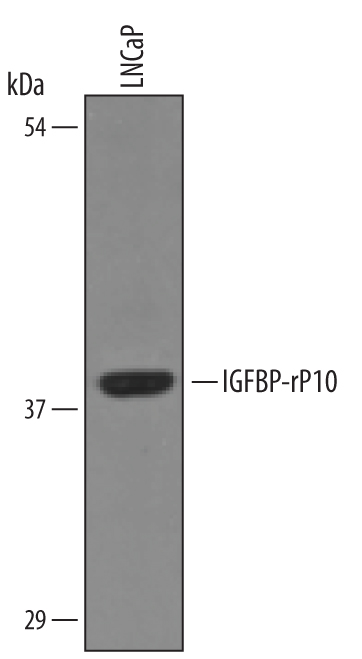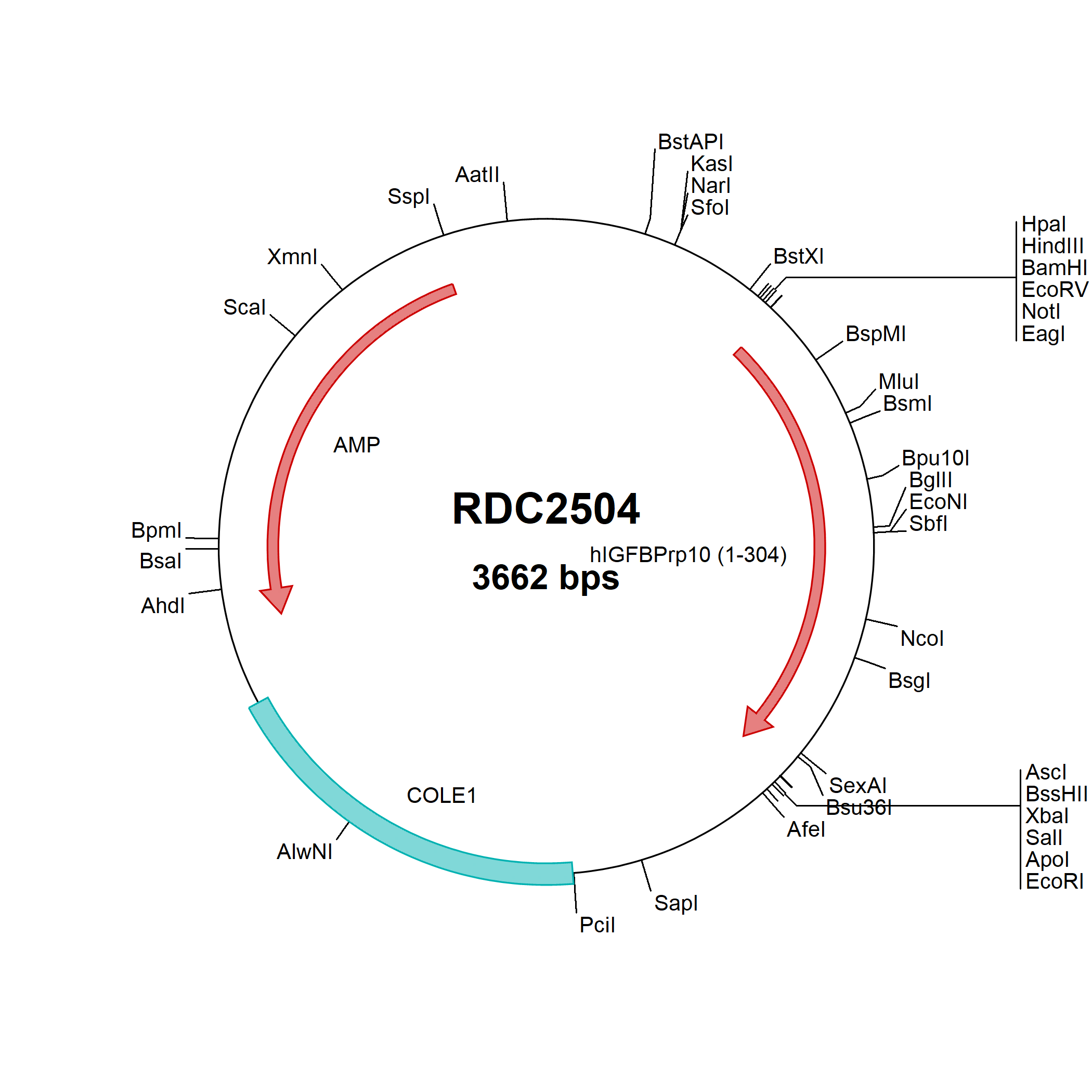IGFBP-rP10 Products
The superfamily of insulin-like growth factor (IGF) binding proteins include the six high-affinity IGF binding proteins (IGFBP) and at least four additional low-affinity binding proteins referred to as IGFBP related proteins (IGFBP-rP). All IGFBP superfamily members are cysteine-rich proteins with conserved cysteine residues, which are clustered in the amino- and carboxy-terminal thirds of the molecule. IGFBPs modulate the biological activities of IGF proteins. Some IGFBPs may also have intrinsic bioactivity that is independent of their ability to bind IGF proteins. Post-translational modifications of IGFBP, including glycosylation, phosphorylation and proteolysis, have been shown to modify the affinities of the binding proteins to IGF. ALS (Acid Labile Subunit) is a liver-derived protein that exists in a ternary complex with Insulin-like Growth Factor (IGF)-binding Protein-3 (IGFBP-3) or IGFBP-5, and either IGF-I or IGF-II. ALS increases the half-life of IGF/IGFBP complexes in circulation.
43 results for "IGFBP-rP10" in Products
43 results for "IGFBP-rP10" in Products
IGFBP-rP10 Products
The superfamily of insulin-like growth factor (IGF) binding proteins include the six high-affinity IGF binding proteins (IGFBP) and at least four additional low-affinity binding proteins referred to as IGFBP related proteins (IGFBP-rP). All IGFBP superfamily members are cysteine-rich proteins with conserved cysteine residues, which are clustered in the amino- and carboxy-terminal thirds of the molecule. IGFBPs modulate the biological activities of IGF proteins. Some IGFBPs may also have intrinsic bioactivity that is independent of their ability to bind IGF proteins. Post-translational modifications of IGFBP, including glycosylation, phosphorylation and proteolysis, have been shown to modify the affinities of the binding proteins to IGF. ALS (Acid Labile Subunit) is a liver-derived protein that exists in a ternary complex with Insulin-like Growth Factor (IGF)-binding Protein-3 (IGFBP-3) or IGFBP-5, and either IGF-I or IGF-II. ALS increases the half-life of IGF/IGFBP complexes in circulation.
| Reactivity: | Human |
| Details: | Sheep IgG Polyclonal |
| Applications: | WB |
| Reactivity: | Human |
| Details: | Sheep IgG Polyclonal |
| Applications: | WB |
| Reactivity: | Mouse |
| Details: | Goat IgG Polyclonal |
| Applications: | WB |
| Applications: | WB |
| Reactivity: | Human |
| Details: | Mouse IgG Polyclonal |
| Applications: | WB |
| Reactivity: | Human |
| Details: | Rabbit IgG Polyclonal |
| Applications: | IHC |
| Reactivity: | Human |
| Details: | Rabbit IgG Polyclonal |
| Applications: | WB |
| Applications: | ELISA |
| Applications: | ELISA |
| Applications: | AC |
| Reactivity: | Human |
| Details: | Rabbit IgG Polyclonal |
| Applications: | WB |
| Reactivity: | Human |
| Details: | Rabbit IgG Polyclonal |
| Applications: | WB |
| Reactivity: | Human |
| Details: | Rabbit IgG Polyclonal |
| Applications: | WB |
| Reactivity: | Human |
| Details: | Rabbit IgG Polyclonal |
| Applications: | WB |
| Reactivity: | Human |
| Details: | Rabbit IgG Polyclonal |
| Applications: | WB |
| Reactivity: | Human |
| Details: | Rabbit IgG Polyclonal |
| Applications: | WB |
| Reactivity: | Human |
| Details: | Rabbit IgG Polyclonal |
| Applications: | WB |
| Reactivity: | Human |
| Details: | Rabbit IgG Polyclonal |
| Applications: | WB |
| Reactivity: | Human |
| Details: | Rabbit IgG Polyclonal |
| Applications: | WB |
| Reactivity: | Human |
| Details: | Rabbit IgG Polyclonal |
| Applications: | WB |
| Reactivity: | Human |
| Details: | Rabbit IgG Polyclonal |
| Applications: | WB |
| Reactivity: | Human |
| Details: | Rabbit IgG Polyclonal |
| Applications: | WB |
| Reactivity: | Human |
| Details: | Rabbit IgG Polyclonal |
| Applications: | WB |
| Reactivity: | Human |
| Details: | Rabbit IgG Polyclonal |
| Applications: | WB |




![Western Blot: IGFBP-rP10/KAZALD1 Overexpression Lysate [NBP2-06155] Western Blot: IGFBP-rP10/KAZALD1 Overexpression Lysate [NBP2-06155]](https://resources.bio-techne.com/images/products/KAZALD1-Overexpression-Lysate-Adult-Normal-Western-Blot-NBP2-06155-img0001.jpg)
![Western Blot: IGFBP-rP10/KAZALD1 Antibody [H00081621-B01P-50ug] Western Blot: IGFBP-rP10/KAZALD1 Antibody [H00081621-B01P-50ug]](https://resources.bio-techne.com/images/products/IGFBP-rP10-KAZALD1-Antibody-Western-Blot-H00081621-B01P-50ug-img0001.jpg)
![Immunohistochemistry-Paraffin: IGFBP-rP10/KAZALD1 Antibody [NBP1-90453] Immunohistochemistry-Paraffin: IGFBP-rP10/KAZALD1 Antibody [NBP1-90453]](https://resources.bio-techne.com/images/products/IGFBP-rP10-KAZALD1-Antibody-Immunohistochemistry-Paraffin-NBP1-90453-img0003.jpg)
![Western Blot: IGFBP-rP10/KAZALD1 Antibody [NBP2-98914] Western Blot: IGFBP-rP10/KAZALD1 Antibody [NBP2-98914]](https://resources.bio-techne.com/images/products/IGFBP-rP10-KAZALD1-Antibody-Western-Blot-NBP2-98914-img0001.jpg)
![ELISA: Human IGFBP-rP10/KAZALD1 ELISA Kit (Colorimetric) [NBP3-39671] Human IGFBP-rP10/KAZALD1 ELISA Kit (Colorimetric)](https://resources.bio-techne.com/images/products/nbp3-39671_human-igfbp-rp10-kazald1-elisa-kit-colorimetric-211020241529273.png)
![ELISA: Human IGFBP-rP10/KAZALD1 - Ready-To-Use ELISA Kit (Colorimetric) [NBP3-39672] Human IGFBP-rP10/KAZALD1 - Ready-To-Use ELISA Kit (Colorimetric)](https://resources.bio-techne.com/images/products/nbp3-39672_human-igfbp-rp10-kazald1-ready-to-use-elisa-kit-color-211020241538040.png)
